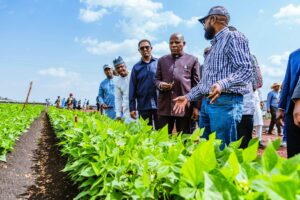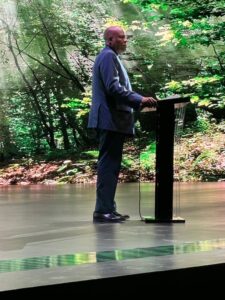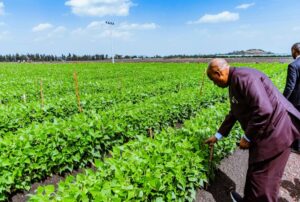Nigeria has once again reaffirmed its leadership role on the African continent, this time by taking the front seat in the continental fight against climate change. During a high-profile state visit to Ethiopia from June 26, Vice President Kashim Shettima represented Nigeria at the official launch of Ethiopia’s Green Legacy Initiative (GLI) — a bold environmental campaign that aims to plant 20 billion trees.
The visit, made at the invitation of Ethiopian Prime Minister Dr. Abiy Ahmed Ali, served not only as a diplomatic engagement but also as a demonstration of Nigeria’s deep commitment to environmental sustainability and Africa’s collective future. In his address at the GLI launch, Vice President Shettima underscored that climate change is not an abstract policy issue but a lived threat requiring immediate, tailored, and practical responses by African nations.






“Ethiopia and Nigeria are the two most populous countries in Africa. This distinction is not just statistical—it is existential,” Shettima stated. “We have the largest stake in Africa’s future. It means more of our people are exposed to the peril of climate change, and we also face the highest cost of inaction.”
The Vice President’s remarks were not mere diplomacy—they reflected the Tinubu administration’s expansive climate strategy, which includes landmark projects such as the Great Green Wall Initiative, the Lake Chad Recharge Project, the Clean Energy Transition Programme, and a massive Afforestation Programme targeting the planting of 20 billion trees in Nigeria from the next planting season.
Prime Minister Abiy praised Nigeria’s support, noting that Shettima’s presence would enhance awareness and collaboration around the Green Legacy Initiative. “With its population and growing economy, Nigeria’s involvement in this programme will help galvanize action across Africa,” he said.
Beyond the launch, Shettima spent Saturday touring Ethiopia’s agricultural and industrial sites, including Adama Dairy Farms, Luke Avocado Nursery, and Biyyo Poultry Farm. These visits, he explained, were not routine—they were learning opportunities aimed at adapting successful Ethiopian models to Nigeria’s local context under the Renewed Hope Agenda.
“I came here to observe and learn. Ethiopia has demonstrated what is possible when citizens rally behind a national cause. We intend to replicate that spirit as we prepare to begin our own 20-billion-tree afforestation drive,” Shettima said.
Nigeria’s own climate actions have already begun to inspire replication across the continent. Rwanda is rolling out a similar tree-planting campaign, Ghana is adopting aspects of Nigeria’s clean energy strategy, and South Africa is studying Nigeria’s anti-desertification initiatives. Ethiopia itself expressed interest in partnering with Nigeria on clean energy technologies.
Under President Bola Tinubu’s leadership, Nigeria is implementing:
Read Also
-
The Great Green Wall Initiative, to restore degraded land and reverse desertification in northern Nigeria;
-
Lake Chad Recharge Project, designed to replenish one of Africa’s most vital water bodies;
-
The Clean Energy Transition Plan, with a $10 billion investment targeting 30% renewable energy by 2030;
-
Annual afforestation efforts, with 100 million trees planted each year.
These efforts are centrally coordinated by the Office of the Vice President, ensuring inter-agency synergy across environment, agriculture, and power ministries.
Vice President Shettima emphasized that Nigeria is no bystander in the climate struggle. “We are not mere spectators—we are partners. And we are ready to do our part to keep Africa green.”
As the continent faces rising climate threats—from desertification to floods and food insecurity—Nigeria is positioning itself not just as the “Giant of Africa” by population or economy, but as a torchbearer for sustainability and resilience.
The state visit marked a defining moment in Nigeria’s green diplomacy, and with strong leadership from President Tinubu and Vice President Shettima, the country is poised to lead Africa in turning climate ambition into action.





